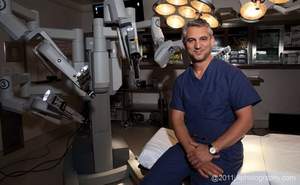An article that was published recently in the Cancer journal explains the link between increase in the occurrence of blood clots and the targeted prostate cancer treatment method, androgen deprivation therapy (ADT).
 David Samadi, MD is the Vice Chairman, Department of Urology and Chief of Robotics and Minimally Invasive Surgery at The Mount Sinai Medical Center in New York City.
David Samadi, MD is the Vice Chairman, Department of Urology and Chief of Robotics and Minimally Invasive Surgery at The Mount Sinai Medical Center in New York City.
This was observed in men who were more than 65 years. The data analysis was conducted on 154,000 men suffering from localised prostate cancer. The study revealed that there was a 56% increase in the risk of blood clots in men who were undergoing ADT when compared to men who were not being treated with ADT.
Dr. David Samadi expressed his interest in the study results and felt that both patients and doctors should also be aware of the study result. Dr. Samadi is the Vice Chairman, Department of Urology, and Chief of Robotics and Minimally Invasive Surgery at The Mount Sinai Medical Center and also an expert robot surgeon specialising in robotic prostatectomy. The hormone, testosterone is responsible for the occurrence of cancer in men.
ADT treatment method works by supressing the secretion of this hormone on the tumour, which influences the progression of the tumour. Typically, hormone therapy is not a standalone procedure and is coupled with radiation therapy. As a result the patient suffers the side effects of both the therapies, such as diabetes, fatigue, loss of memory and occurrence of fatal blood clots. Dr. Samadi claimed that treating men through robotic methods was devoid of any side effects and produced more successful outcomes. He uses the Samadi Modified Advanced Robotic Technique (SMART) for removing the cancerous prostate from men. This surgical method involved minimum incision and was capable of removing only the affected areas with accuracy and leaving the surrounding healthy tissues unaffected. The procedure takes very less time for completion and therefore the recovery is also faster. The success rate is 97% and results in complete removal of cancerous cells. This is devoid of any harmful side effects like formation of blood clots or radiation exposure.